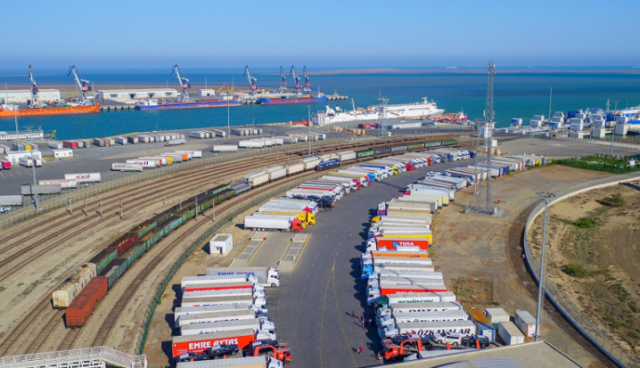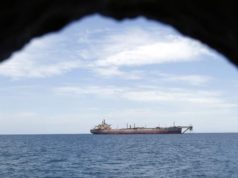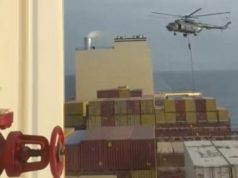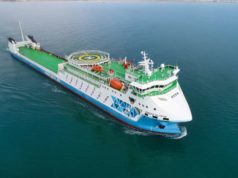On January 29th in Brussels, the Global Gateway Forum’s plenary session opened, focused on bolstering transport connections between the European Union and Central Asia. European Commission Executive Vice President Valdis Dombrovskis announced that European and international financial institutions present at the Forum will commit €10 billion in support and investments towards sustainable transport connectivity in Central Asia. Over the next two days, participants discussed the required investments to transform the Trans-Caspian Transport Corridor into a cutting-edge, multimodal, and efficient route, connecting Europe and Central Asia within 15 days. The European Investment Bank (EIB), represented by its Vice President Teresa Czerwińska, signed Memoranda of Understanding totalling €1.47 billion with the Governments of Kazakhstan, Kyrgyzstan and Uzbekistan as well as the Development Bank of Kazakhstan.
In this context, Azerbaijan, a major player in the Trans-Caspian International Transport Corridor, is keenly developing its commercial fleet within and beyond the Caspian basin. As the owner of the Caspian Sea’s largest commercial fleet, Azerbaijan is taking bold steps to consolidate its regional dominance. This includes launching new ports and shipyards. The Azerbaijan Caspian Shipping Company (ASCO), founded in 1858, boasts a fleet of 367 vessels and ships. In an effort to expand this fleet, ASCO has entered into a $60 million deal with the European Bank for Reconstruction and Development (EBRD) for the acquisition of two cargo ships. The goal is to fortify regional links through the Trans-Caspian International Transport Route (Middle Corridor) and to extend the trading fleet’s operations into international waters beyond the Caspian Sea.
Maritime ports, such as the Baku International Sea Trade Port, the Govsan International Sea Trade Port, as well as Zira, Sangachal, Dubendi ports, and the AzTrans oil terminal, are playing an increasingly prominent role in the ever-evolving global landscape. The Baku International Sea Trade Port, in particular, emerges as a strategic nexus, bridging Central Asia with Europe and fostering close collaboration with the ports of these regions. Most of the cargo flow through the Port of Baku is destined for Kazakhstan and Turkmenistan.

Elmar Habibli, the spokesperson for the Baku International Sea Trade Port, highlighted its position at the intersection of vital international transport routes and the Silk Road, making it one of the region’s leading logistics centers, equipped with advanced loading and unloading systems.
With the capacity to handle 15 million tons of cargo and 100,000 TEU containers annually, the Port of Baku comprises three terminals designed for processing containers, wheeled machinery, wagons, as well as bulk and liquid cargoes, all adhering to modern standards. The Dubendi section of the Port includes an oil terminal for the transshipment of oil and petroleum products.
Habibli noted that despite the port’s current capacity of 15 million tons, the volume of transit cargo through Azerbaijan is on the rise, with expectations for continued growth. In response, under President Ilham Aliyev’s directive, preliminary works have commenced on the Port of Baku’s second phase of construction. This expansion will elevate the port’s capacity to 25 million tons and 500,000 TEU containers, enabling it to more effectively manage the increasing cargo volumes.
Additionally, the construction of a fertilizer terminal at the Port of Baku, with a yearly throughput of 2.5 million tons, is nearing completion. This facility will facilitate the transportation of large fertilizer volumes from Central Asia through Azerbaijan to other nations, significantly boosting cargo movement through the Port of Baku. This enhancement will further develop and reinforce the port’s role as a critical transport hub in the region.

Transport expert Rauf Agamirzayev has underscored the importance of Azerbaijani ports, spotlighting their potential and extensive transport infrastructure in various sectors. This significance is amplified by Azerbaijan’s geostrategic location at the juncture of Europe and Asia, along the Caspian Sea shores.
Agamirzayev singled out the new port of Zira as a pivotal deep-water facility currently under construction, seamlessly integrated into the broader transport network through a new 14-kilometer railway line. According to him, this port is set to play a crucial role in redistributing cargo flows.
Furthermore, Agamirzayev pointed to the crucial roles of the Sangachal, Dubendi, and the AzTrans oil terminal in handling liquid cargoes, including oil and chemical products. The Baku International Sea Trade Port relocation to Alat, outside the city, was necessitated by the growing demand for cargo transportation. The natural wave protection provided by Gil Island facilitates the steady reception of cargoes there.

He also reported on the construction of hydraulic bridges designed to mitigate risks associated with Caspian Sea level fluctuations, along with plans for seabed deepening in anticipation of potential water level decreases. The Baku Shipyard has already started to fulfill orders for vessels capable of operating in these adjusted conditions.
Agamirzoev emphasized that the expansion and development of port infrastructure in Azerbaijan, including its integration with road and rail networks and the alignment of investments with freight transportation needs, substantially enhance their capacity and efficiency.

Political scientist Rashad Bayramov argued that Azerbaijan’s proactive strategy in adapting its transport infrastructure to meet modern global standards and in boosting its transit potential is a significant driver of the country’s socio-economic development. He highlighted ongoing intensive efforts to modernize the transport system, expand transit options, and develop contemporary transport infrastructure. These endeavors are expected to yield considerable political and economic benefits, bolster Azerbaijan’s international stature, and amplify its political and strategic relevance globally.
Bayramov also noted that maritime transport, a strategic sector of the Azerbaijani economy, is entering a new development phase. The enhancement of transport corridors across Azerbaijan has spurred growth in maritime shipping, port infrastructure, and related shipbuilding, modernization, and repair sectors.
“The strategic aim to position Azerbaijan as a key regional transport and logistics hub, particularly through the development of seaports, is critical for boosting the country’s transit capacity. The primary objective in developing Azerbaijan’s port infrastructure is to secure transport flow safety, transform Baku into a modern, significant logistics and transport node in the Caspian basin, deepen cooperation with Caspian states, and, ultimately, ensure efficient operation of the North-South and East-West transport corridors,” highlighted the political scientist.
P.S. In the last two decades, Azerbaijan has achieved significant progress in fortifying its transport infrastructure beyond the oil sector, thanks to strategic initiatives. These efforts have not only expanded the country’s transit capabilities but also positioned Azerbaijan as a pivotal transport and logistics hub. As a result, the volume and quality of transit transportation have increased, with these advancements continuing to evolve successfully.
News.Az







